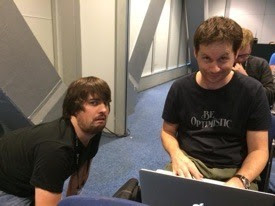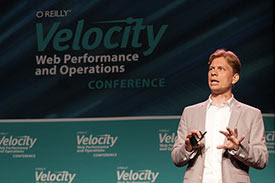1. Chop wood, carry water
|
| Words like persistence and work rarely show up in the same sentence as DevOps. There are DevOps consultants and entrepreneurs—people and companies promising jetpacks and hovercrafts delivered on schedule and with cost savings. It's the software equivalent of the legendary savant writer struck by divine genius, churning out perfect page after page without fail and swimming in millions from her bestselling novels. But there is no mad genius about writing, just as there's no secret sauce of DevOps. It takes concerted, daily effort that looks like this. |
2. PCC: performance-oriented congestion control
|
| The TCP family has failed to achieve consistent high performance in face of the complex production networks: even special TCP variants are often 10x away from optimal performance. On the other hand, PCC promises dramatically higher performance data delivery with a flexible transport architecture, and here is the data to make the case. |
3. Waiting will only cost you more
|
 We've got great plans in the works for Velocity this year. You may have picked up on the signals already. To stay informed, sign up to receive exclusive access to behind-the-scenes news, updates, and offers—as they happen. (This includes first notice of a limited number of early-release tickets to Velocity in Santa Clara.) We've got great plans in the works for Velocity this year. You may have picked up on the signals already. To stay informed, sign up to receive exclusive access to behind-the-scenes news, updates, and offers—as they happen. (This includes first notice of a limited number of early-release tickets to Velocity in Santa Clara.)
|
4. The computing of distrust
|
| In the future, we'll rely increasingly on systems that we can't necessarily trust to do our bidding and that fail in indeterministic ways. Mike Loukides presents an intriguing look at what lies ahead in the disenchanted age of postmodern computing. |
5. Anomaly detection in a time series that works
|
| For the last two years, Twitter experienced a spike in the number of photos uploaded to its service on Christmas Eve, Christmas, and New Year's Eve (in other words, an anomaly occurred in the corresponding time series). You may have experienced the same. If so, you'll want to look at AnomalyDetection, Twitter's open-source R package that automatically detects anomalies like these in big data in a practical and robust way. |
Sponsored Content
You can't change what you don't measure
|
 It's easy to figure out that something is wrong with your website's performance, but pinpointing the specific problem is a lot harder, especially when you're not measuring the right things. Just as a doctor needs to run tests before diagnosing a patient, you need to be monitoring all of the things that can possibly go wrong before you can determine exactly what went wrong. It's easy to figure out that something is wrong with your website's performance, but pinpointing the specific problem is a lot harder, especially when you're not measuring the right things. Just as a doctor needs to run tests before diagnosing a patient, you need to be monitoring all of the things that can possibly go wrong before you can determine exactly what went wrong.
Join Mehdi Daoudi, CEO and Co-founder of Catchpoint Systems, in this free webcast, happening Wednesday, January 28, at 10am PT. Learn what you need to measure in order to correct problems and do so before your users are affected. Thank you to Catchpoint Systems for sponsoring this event.
|
6. Set a new year's resolution that you can keep
|
| A resolution for your website, that is. In plain, straightforward language, Tammy Everts shows you how to set performance goals for your site that you can actually keep this year. No need to join the Cult of Simplification, Everts says, but simplify and stay focused on what matters. |
7. Dockerize your application
|
 Get started with Docker and learn how to deploy your software applications as portable, self-sufficient containers that can run on almost any server with Andrew Baker'snew training video Introduction to Docker. If you're familiar with deploying and managing software applications in production, this video tutorial provides the knowledge you need to "Dockerize" an application and deploy it to the cloud using containers, images, and Dockerfiles. Get started with Docker and learn how to deploy your software applications as portable, self-sufficient containers that can run on almost any server with Andrew Baker'snew training video Introduction to Docker. If you're familiar with deploying and managing software applications in production, this video tutorial provides the knowledge you need to "Dockerize" an application and deploy it to the cloud using containers, images, and Dockerfiles.
|
8. You on stage, at Velocity 2015 in Santa Clara
|
 There's still time to make your mark at Velocity in Santa Clara. If you have an interesting success (or failure!) story, provocative idea, or practical how-to session idea, we'd love to hear from you. With a new focus and new themes, it's going to be an important event. Deadline for proposals is February 2, 2015. There's still time to make your mark at Velocity in Santa Clara. If you have an interesting success (or failure!) story, provocative idea, or practical how-to session idea, we'd love to hear from you. With a new focus and new themes, it's going to be an important event. Deadline for proposals is February 2, 2015.
|
댓글 없음:
댓글 쓰기